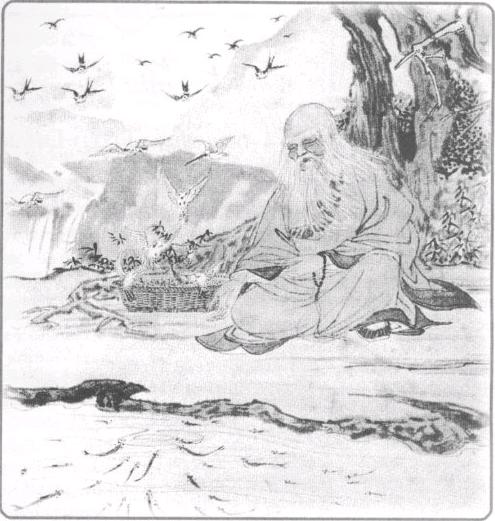|
一九七十年代中,美國加州遭受了兩年嚴重的乾旱。當時我好多次給上人開車。一次在三藩市的金山寺,上人上車後問我:「你知道金門公園有水塘嗎?」我以前住在那公園附近,去過許多次。我回說知道有好幾個。「那好,我們去那兒。」我就開去了金門公園。車上就三個人,上人、我,還有我女兒果青,那時三、四歲吧。
到公園時才上午九點,我直奔心中最想去的那個水塘。那水塘挺大,快成個小湖了,有人在水邊玩模型船。車到塘邊,上人說:「這個不行,再找一個。」我們繼續開車,一直開到一個小得多,孤伶伶的水塘邊;四周是樹、灌木,和一條單行道。上人喜歡這個水塘,讓我停了下來。
有許多年了,上人外出時都帶一個藍色的粗帆布袋。這種袋子是為買副食品而做的,和店裡的大牛皮紙袋相當。(當時尚未改用塑膠袋。)我們三個人下了車,上人打開布袋,我沒想到裡面全是麵包頭。上人告訴我們要來餵鳥;我們走到塘邊唯一的一把椅子旁,上人告訴我們他要鳥 來吃麵包,我們要念大悲咒,於是我們就坐下來開始念咒。
接下來,就發生了我一生中遇到的最奇妙的事。上人從包中拿出麵包,餵給身邊周圍的幾隻鳥。一轉眼,海鷗、水鳥、水老鴨鷺鶿、鴿子,都像蜜蜂一樣,從四面八方湧過來。上人向空中拋麵包,侵犯性強的海鷗飛撲下來,麵包還沒落地就用尖嘴夾住了。上人向地下丟麵包,鳥也是成群來爭搶。鳥群膽子大了之後,我和果青倆也開始餵這些饑餓的鳥,想讓膽小的鳥也吃得到。我們倆看著鳥的滑稽像,覺得好笑,一邊還努力不忘念咒。更多的鳥群飛來了,有的落在我們肩上,總數不下一百隻。
教育鳥,上人的方法和教育人差不多:侵犯性強的鳥來搶手上的麵包時,上人就會笑;快啄到時就把手抽開,讓牠啄不到;對下一隻來的鳥,也是一樣。我和果青都很興奮,心裡知道自己和鳥一樣,都受著欲望的驅使。大約餵了十五分鐘,麵包光了。上人拿起藍布袋,我們起身走了。在上車的路上,或許在車上吧,上人說那些鳥確實餓了。我想這是因為乾旱的關係。
一、兩天後,我們又和上人去了一趟;餵時,鳥的反應同樣熱烈。一、兩週後,我想自己去餵鳥,就和女兒果青拿了一條麵包,到同個水塘。可這次鳥的反應大不相同,來的很少;就算來了,反應也不像前兩次和上人一起餵時那麼熱烈。有人問為什麼差別如此之大,我說顯然這些鳥和人一樣,為上人的道德慈悲所吸引。上人百忙中來餵牠們,牠們感覺得到上人是特殊的人,所以飛來親近。
|
|
In the mid 1970s, California suffered through a severe two year drought. During that time, I had many opportunities to act as the Venerable Master's chauffeur. Once, as the Master climbed into the car at Gold Mountain Monastery in San Francisco, he asked, "Do you know of any good ponds in Golden Gate Park?"
Because I lived near the park and had visited it many times, I replied, "Yes, I know of a few."
The Master said, "Good; let's go," and off we went to explore Golden Gate Park. In the car there were three of us, the Venerable Master, Gwo-Ching, my daughter, who was three or four years old and I. When we arrived at the park, it was about nine in the morning, and we went straight to what I thought was a perfect pond. It was large enough that some might consider it a small lake, where men sailed their model boats. As we drove up to the water's edge, the Master said, "This one isn't right. We need to find another one." We continued to drive until we found ourselves at the edge of a much smaller and more isolated pond, surrounded by trees and bushes on a small one-lane road. The Master liked this pond and told me to park the car.
For many years the Master carried a blue canvas bag whenever he went out. This bag was made for people who might need to walk to the store when they went grocery shopping, because it was just the right size to accommodate a large brown paper grocery bag (this was a time when grocery stores hadn't made the change to plastic bags). As the three of us got out of the car, the Master opened up his bag to reveal something I hadn't expected to see. It was full of heels of bread, and he told us we were going to feed the birds. We walked over to the only bench in sight, which was appropriately facing the pond, and the Master told us what he wanted to do. He said we should recite the Great Compassion Mantra as the birds take the bread. Then we sat down and began reciting.
What happened next was one of the most magical experiences of my life. The Master reached into his bag and pulled out some bread to feed to the few birds that were there. Instantly, from all directions, came many birds including gulls, loons, cormorants and pigeons, which swarmed us like bees in a hive. The Master threw some bread in the air and the most aggressive gulls swooped down and grabbed pieces in their beaks even before they hit the ground. Then he tossed morsels on the ground and the birds fought over them. As the birds got more and more bold, the two of us also joined in feeding the hungry creatures, trying to find ways to get bread to the more timid among them. We were both laughing at their antics and trying to remember to recite the mantra. More birds kept arriving until some of them even landed on our shoulders. There must have been more than one hundred of them.
 |
The Master was teaching the birds in much the same way he taught us humans. He would tease an aggressive one by offering it bread with his hand, and then pull the morsel out of reach just as the bird had committed to making a grab for it. Then he would laugh and do the same thing again to the next bird that came forward. During all of this Gwo-Ching and I were having a wonderful time but I still knew inside we were just like the birds driven by greed and desire. We continued the feeding for probably about 15 minutes until all the bread was gone. Then the Master picked up his blue bag, and we got up to leave. On the way to the car, or maybe it was in the car, the Master said that the birds were really hungry. I assumed it was because of the drought.
In a day or two, we picked up the Venerable Master and did the very same thing and got the same response. About a week or two later I thought to feed the birds without the Master. So Gwo-Ching and I took a loaf of bread and went to the same pond, but this time the response was much different. Very few birds showed up, and the ones that did, lacked the enthusiasm of the birds that came when the Venerable Master was there. Someone asked me why I thought this last time was so much different. I said that it was obvious to me that the birds, just like humans, were attracted to the Venerable Master's presence including his virtue and compassion. He took time out of his busy schedule to feed them, and these birds sensed that he was someone special and wanted to be near him.
|